36th Annual Holocaust Series Draws to a Close
As the 36th round of the Holocaust Lecture Series draws to a close, we are thoughtful, wiser and pleased to have hosted such wonderful and thought provoking speakers and films.
 Beginning with the newly translated art installation of Justes de l’Isere from the Museum of Resistance and Deportation of Isere, the 8 panel collage of photos, artifacts and documents traveled across Vanderbilt campus for eight weeks and was featured in many frequently traveled and utilized locations. The final day featured a documentary screening of a film about the Righteous in Isere that was meticulously translated by a team of Vanderbilt students, faculty and friends.
Beginning with the newly translated art installation of Justes de l’Isere from the Museum of Resistance and Deportation of Isere, the 8 panel collage of photos, artifacts and documents traveled across Vanderbilt campus for eight weeks and was featured in many frequently traveled and utilized locations. The final day featured a documentary screening of a film about the Righteous in Isere that was meticulously translated by a team of Vanderbilt students, faculty and friends.
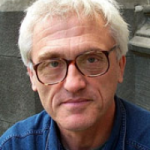 Dr. Jan Gross, author of the acclaimed book Neighbors: The Destruction of the Jewish Community of Jedwabne, Poland (2002) was our first speaker for 2013. In his talk Prof. Gross described the reaction his book elicited after its publication in Poland, as well as his more recent research on this important topic. The Ben Schulman Center for Jewish Life was filled with students, staff, and friends to hear the author of this landmark work that gave the series this year its theme.
Dr. Jan Gross, author of the acclaimed book Neighbors: The Destruction of the Jewish Community of Jedwabne, Poland (2002) was our first speaker for 2013. In his talk Prof. Gross described the reaction his book elicited after its publication in Poland, as well as his more recent research on this important topic. The Ben Schulman Center for Jewish Life was filled with students, staff, and friends to hear the author of this landmark work that gave the series this year its theme.
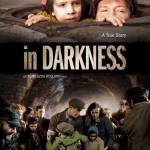 Next, we were please to show a award winning film that displayed our theme in the context of the Holocaust. From acclaimed director Agnieszka Holland (Europa, Europa), In Darkness is based on a true story. Leopold Socha, a sewer worker and petty thief in Lvov, a Nazi-occupied city in Poland, one day encounters a group of Jews trying to escape the liquidation of the ghetto. He hides them for money in the labyrinth of the town’s sewers beneath the bustling activity of the city above. What starts out as a straightforward and cynical business arrangement turns into something very unexpected; the unlikely alliance between Socha and the Jews as the enterprise seeps deeper into Socha’s conscience. The film is also an extraordinary story of survival as these men, women and children all try to outwit certain death during 14 months of ever increasing and intense danger.
Next, we were please to show a award winning film that displayed our theme in the context of the Holocaust. From acclaimed director Agnieszka Holland (Europa, Europa), In Darkness is based on a true story. Leopold Socha, a sewer worker and petty thief in Lvov, a Nazi-occupied city in Poland, one day encounters a group of Jews trying to escape the liquidation of the ghetto. He hides them for money in the labyrinth of the town’s sewers beneath the bustling activity of the city above. What starts out as a straightforward and cynical business arrangement turns into something very unexpected; the unlikely alliance between Socha and the Jews as the enterprise seeps deeper into Socha’s conscience. The film is also an extraordinary story of survival as these men, women and children all try to outwit certain death during 14 months of ever increasing and intense danger.
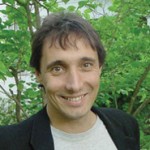 Putting off the fall break, students came out to enjoy the next speaker in the series who is one of our very own, Dr. Helmut Smith. In March 1900, in the West-Prussian town of Konitz, the dismembered body of a young man was found. When police failed to identify a clear suspect for the murder, rumors began to circulate that this had been a case of ritual murder perpetrated by local Jews. Over the ensuing months, an escalating cycle of accusations and hate tore the town of Konitz apart, and army troops had to be called in to keep the peace. Helmut Smith, Martha Rivers Ingram Professor of History at Vanderbilt, described in his talk how the long traditions of anti-Semitism in German culture contributed to this remarkable breakdown of civic unity in a small German town.
Putting off the fall break, students came out to enjoy the next speaker in the series who is one of our very own, Dr. Helmut Smith. In March 1900, in the West-Prussian town of Konitz, the dismembered body of a young man was found. When police failed to identify a clear suspect for the murder, rumors began to circulate that this had been a case of ritual murder perpetrated by local Jews. Over the ensuing months, an escalating cycle of accusations and hate tore the town of Konitz apart, and army troops had to be called in to keep the peace. Helmut Smith, Martha Rivers Ingram Professor of History at Vanderbilt, described in his talk how the long traditions of anti-Semitism in German culture contributed to this remarkable breakdown of civic unity in a small German town.
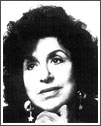 In collaboration with the Tennessee Holocaust Commission, the series welcomed Dr. Nelly Toll to speak at the Student Life Center. Dr. Toll was born in Lvov, Poland. As a young child, Dr. Toll was sent to live with a sympathetic Polish family. While hiding, Dr. Toll painted 64 watercolors of family, friends, and children. Her vivid illustrations combine fairy tale figures with pre-war memories and depict a fantasy world, freedom, and child’s play. Dr. Toll’s memoir, Behind the Secret Window, won nine awards and has been performed in the Netherlands and throughout the U.S. Her paintings hang at the U.S. Holocaust Museum in Washington, D.C. and Yad Vashem in Jerusalem.
In collaboration with the Tennessee Holocaust Commission, the series welcomed Dr. Nelly Toll to speak at the Student Life Center. Dr. Toll was born in Lvov, Poland. As a young child, Dr. Toll was sent to live with a sympathetic Polish family. While hiding, Dr. Toll painted 64 watercolors of family, friends, and children. Her vivid illustrations combine fairy tale figures with pre-war memories and depict a fantasy world, freedom, and child’s play. Dr. Toll’s memoir, Behind the Secret Window, won nine awards and has been performed in the Netherlands and throughout the U.S. Her paintings hang at the U.S. Holocaust Museum in Washington, D.C. and Yad Vashem in Jerusalem.
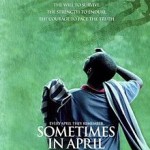 In an
In an 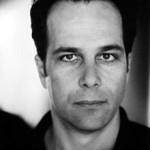 effort to also focus on another genocide during each Holocaust Lecture Series, this year, we turned to the 1994 genocide in Rwanda. In collaboration with the Bishop Joseph Black Cultural Center, we were please to show Sometimes in April, and then the following evening bring Phillip Gourevitch. We wish to inform you that tomorrow we will be killed with our families. This is the title of Philip Gourevitch’s award-winning book about the 1994 Rwandan genocide of Tutsis by Hutus, in which nearly a million persons were systematically murdered. Currently Mr. Gourevitch – a regular contributor to the New Yorker magazine – is working on a new book about the aftermath of the Rwandan genocide – how a society can begin to recover from a collective trauma of such magnitude. In his talk he shared with us his most recent research and reflections. Also focusing on the theme of “neighbors”, Mr Gourevitch helped the audience see how the community in Rwanda is living together in the wake of this tragedy.
effort to also focus on another genocide during each Holocaust Lecture Series, this year, we turned to the 1994 genocide in Rwanda. In collaboration with the Bishop Joseph Black Cultural Center, we were please to show Sometimes in April, and then the following evening bring Phillip Gourevitch. We wish to inform you that tomorrow we will be killed with our families. This is the title of Philip Gourevitch’s award-winning book about the 1994 Rwandan genocide of Tutsis by Hutus, in which nearly a million persons were systematically murdered. Currently Mr. Gourevitch – a regular contributor to the New Yorker magazine – is working on a new book about the aftermath of the Rwandan genocide – how a society can begin to recover from a collective trauma of such magnitude. In his talk he shared with us his most recent research and reflections. Also focusing on the theme of “neighbors”, Mr Gourevitch helped the audience see how the community in Rwanda is living together in the wake of this tragedy.
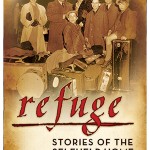 In the late 1930s – with the violence and destruction of Kristallnacht foreshadowing the devastation of European Jewry – a determined group of German Jewish refugees left behind well-established lives and most of their possessions and immigrated to Chicago. Here, these newcomers set out to create a supportive community for themselves and others fleeing Nazi persecution, eventually establishing the Selfhelp Home. Over time, Selfhelp has brought together over 1,000 Central European elderly refugees and Holocaust survivors under one roof. Refuge: Stories of the Selfhelp Home is a one-hour documentary that reaches back more than 70 years to tell the stories of this last generation. Joined by its director, Ethan Bensinger, the amazing story of these survivors coming together was shown to the Vanderbilt community at the Commons Center.
In the late 1930s – with the violence and destruction of Kristallnacht foreshadowing the devastation of European Jewry – a determined group of German Jewish refugees left behind well-established lives and most of their possessions and immigrated to Chicago. Here, these newcomers set out to create a supportive community for themselves and others fleeing Nazi persecution, eventually establishing the Selfhelp Home. Over time, Selfhelp has brought together over 1,000 Central European elderly refugees and Holocaust survivors under one roof. Refuge: Stories of the Selfhelp Home is a one-hour documentary that reaches back more than 70 years to tell the stories of this last generation. Joined by its director, Ethan Bensinger, the amazing story of these survivors coming together was shown to the Vanderbilt community at the Commons Center.
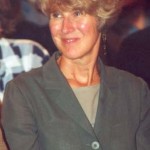 Prof. Orla-Bukowska is a social anthropologist at the Jagiellonian University in Kraków, Poland, and the coauthor of the 2007 book, Rethinking Poles and Jews: Troubled Past, Brighter Future. In her lecture she returned to some of the themes and problems discussed by Prof. Jan Gross at the beginning of this lecture series, sharing her research on current efforts in Poland at reconciliation and cultural bridge-building between Jews and non-Jews. With Dr. Orla-Bukowska’s talk to a overflowing room in Alumni Hall, the audience was brought to think of the current context of Poland and the aftermath that still lingers today from the devastation the country experienced.
Prof. Orla-Bukowska is a social anthropologist at the Jagiellonian University in Kraków, Poland, and the coauthor of the 2007 book, Rethinking Poles and Jews: Troubled Past, Brighter Future. In her lecture she returned to some of the themes and problems discussed by Prof. Jan Gross at the beginning of this lecture series, sharing her research on current efforts in Poland at reconciliation and cultural bridge-building between Jews and non-Jews. With Dr. Orla-Bukowska’s talk to a overflowing room in Alumni Hall, the audience was brought to think of the current context of Poland and the aftermath that still lingers today from the devastation the country experienced.
With a grateful, yet heavy heart, we conclude the 36th annual Holocaust Lecture Series. While the lessons we have taken away from this year’s series have enriched us all, there is still much more work yet to be done. Any thoughts on whom we should bring for next year’s series? If so, comment on the OUCRL Facebook page and let us know!